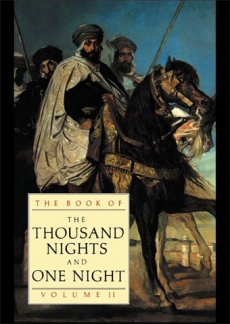|
THE TALE OF KAMAR AL-ZAMAN AND THE PRINCESS BUDUR, MOON OF MOONS
But when the hundred-and-seventieth night had come
Little Dunyazad, who could not contain her impatience, rose from her carpet and said to Shahrazad:
‘Sister, I pray you hasten to tell us the tale which you have promised; for its title alone has filled my heart with joy.’
Shahrazad smiled at her sister, saying: ‘I wait the good pleasure of the King.’
King Shahryar, who that night had hurried over his usual embrace because of his anxiety to hear the story, said: ‘O Shahrazad, you may begin the fairy tale which you have so agreeably announced.’
So Shahrazad told the following tale:
It is related, O auspicious King, that there was once, in the antiquity of time, a sultan called Shahriman, master of armies and great wealth, who ruled over the land of Khalidan. Although he was in all other things happy, and possessed seventy concubines and four wives, he suffered the grief of being childless; for he had already reached a great age, and the marrow had begun to dry within him without Allah having granted him an heir to the throne.
One day he confided his secret sorrow to his grand-wazir, saying: ‘I can find no reason for this torturing sterility.’ The Wazir reflected for an hour before raising his head and answering: ‘The problem is a delicate one, soluble by none save Allah. I can only think of one remedy. Before you enter the women’s quarter to-night, fulfil the duties of faith with unusual care, make your ablutions fervently, and pray to Allah with a submissive heart, so that your union may become fertile through His blessing.’
‘Master of wise words,’ cried Shahriman, ‘your remedy is an excellent one.’ He gave the Wazir a robe of honour; and that evening ...
| 